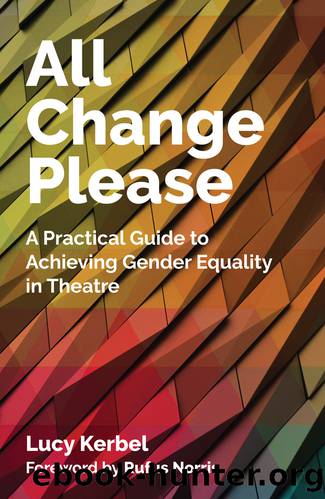All Change Please by Kerbel Lucy;

Author:Kerbel, Lucy;
Language: eng
Format: epub
Publisher: Nick Hern Books, Limited
Expanding our tastes â and our minds
If we can become broader-minded about what excellent theatre can be, the possibilities are endless and exciting: we will have expanded the repertoire immeasurably; ensured a greater diversity of work for our audiences to experience; made space for a wider range of stories and perspectives to challenge and inspire us; opened up to new ideas and ways of thinking about the world coming into our rehearsal rooms and offices, as well as on to our stages. It could lead to us entirely rethinking the models around how we make theatre, and what that theatre looks like and says both to and about the world. It could be the springboard for one of the most exciting artistic revolutions theatre has ever known.
At the very least, it would be a wonderful learning opportunity. To speak from personal experience, I know that going through the process of conducting the research for my first book, 100 Great Plays for Women, broadened my own theatrical horizons significantly, along with my conception of what dramatic writing can be and do. The activity, which the research forced me to do, of reading plays that fell outside my pre-existing sphere of knowledge, or that I may have considered outside of my tastes, or which I probably wouldnât otherwise have read because for whatever reason I didnât consider them relevant to me, was a huge learning curve. Despite having previously considered myself very well read â and indeed, for years Iâd been tearing through plays almost compulsively â I discovered there was a far broader range of material out there than Iâd known about â because while Iâd been reading lots of plays, they often tended to be the same kinds of plays. My goal with 100 Great Plays for Women was to assemble a purposefully eclectic range of works for many different tastes, and as part of that I had to be able to articulate what made each of them worthy of the title âgreatâ. To do this I had to take time to understand why others may love them, even if I, on initial reading, didnât. As it was, taking the time to do so meant I ended up falling in love with those plays myself.
Iâll finish this section with a conversation I had with a playwright a few years ago. I was interviewing him as part of a research study Tonic was doing at the time into opportunities for girls taking part in youth drama, with a particular focus on the type of roles available to them. The writer was musing over the differences between writing male and female characters in view of how we currently think of drama. He told me about having been commissioned a few years earlier to write two parallel monologues for young audiences, one to be performed by the character of a teenage boy, the other by the character of a teenage girl. The boyâs monologue, he said, he found far more straightforward to write.
Download
This site does not store any files on its server. We only index and link to content provided by other sites. Please contact the content providers to delete copyright contents if any and email us, we'll remove relevant links or contents immediately.
Call Me by Your Name by André Aciman(19972)
Ready Player One by Cline Ernest(14086)
How to Be a Bawse: A Guide to Conquering Life by Lilly Singh(7180)
Wiseguy by Nicholas Pileggi(5353)
The Kite Runner by Khaled Hosseini(4979)
On Writing A Memoir of the Craft by Stephen King(4688)
Audition by Ryu Murakami(4636)
The Crown by Robert Lacey(4593)
Call me by your name by Andre Aciman(4473)
Gerald's Game by Stephen King(4393)
Harry Potter and the Cursed Child: The Journey by Harry Potter Theatrical Productions(4329)
Dialogue by Robert McKee(4186)
The Perils of Being Moderately Famous by Soha Ali Khan(4079)
Dynamic Alignment Through Imagery by Eric Franklin(3941)
Apollo 8 by Jeffrey Kluger(3521)
How to be Champion: My Autobiography by Sarah Millican(3500)
The Inner Game of Tennis by W. Timothy Gallwey(3500)
Seriously... I'm Kidding by Ellen DeGeneres(3426)
Darker by E L James(3414)
